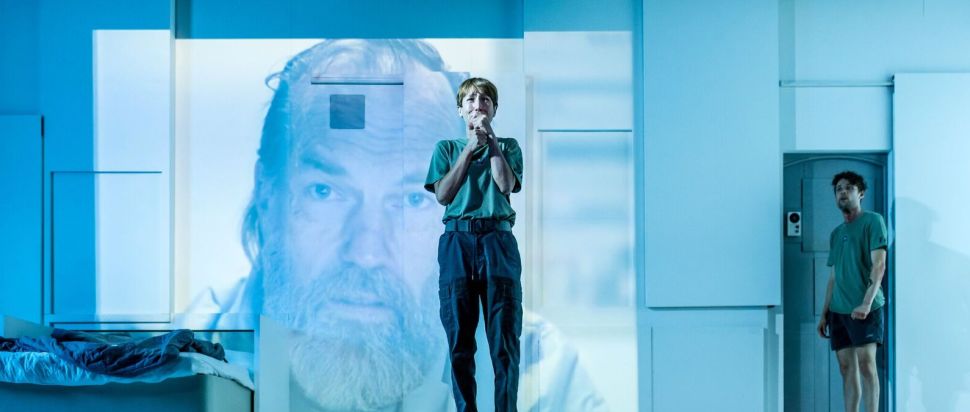Solaris @ Royal Lyceum, Edinburgh
Humans come face-to-face with an alien lifeform in David Greig's new adaptation of Solaris
Australian director Matthew Lutton and Scottish playwright David Greig team up in this intriguing adaptation of Polish writer Stanisław Lem’s 1961 novel Solaris, which itself has thrice been adapted into a film. Contrary to Lem’s original text, psychologist Kris Kelvin (Polly Frame) is a woman in this production, as is crew member Sartorius (Jade Ogugua). Fode Simbo provides some comic relief as Snow, whilst Keegan Joyce plays Ray, a ‘visitor’ from the watery planet of the title. A bearded Hugo Weaving also appears via video as Gibarian, a scientist on the space station who committed suicide shortly before Kris’ arrival.
Set and costume designer Hyemi Shin does a good job at conveying the aesthetic of 60s and 70s sci-fi: the stage is white and sterile, like a space station in miniature. This stage is occasionally infused with red or blue by lightning designer Paul Jackson, matching (or shaping) the mood of the characters.
The production has certain cinematic qualities: vignette-like scenes are divided by the rise and fall of the stage curtain, which at times acts as a screen on which the rolling waves of the planet Solaris are projected. Initially, the play is deliberately confusing – both the audience and the characters on stage are unsure what is going on – but the central theme of Solaris turns out to be a phenomenon both mundane and universal: love. The catch, however, is that Kris finds herself falling in love with a planet, as well as her ex-lover Ray.
The relationship between Kris and Ray is depicted sensitively and believably, but there is also a darker, more sinister edge to the play. As you watch Solaris, allow yourself to be transported into a future that is also our past: these astronauts, for example, still use VHS, in one of many nice period touches in this accomplished production.
At a time when more and more people are growing concerned about the abusive relationship humanity has with planet Earth, Solaris feels deeply relevant, exploring as it does the question of how we humans would interact with extraterrestrial beings. Who, in this situation, would be considered the hostile aggressor? The joy of science fiction is that it allows us to visualise and experience the hypothetical and the abstract. This is true of film and fiction, but it is arguably even more the case with theatre, when stories like Solaris play out live before our eyes.
Solaris, Royal Lyceum Theatre, Edinburgh, until 5 Oct
